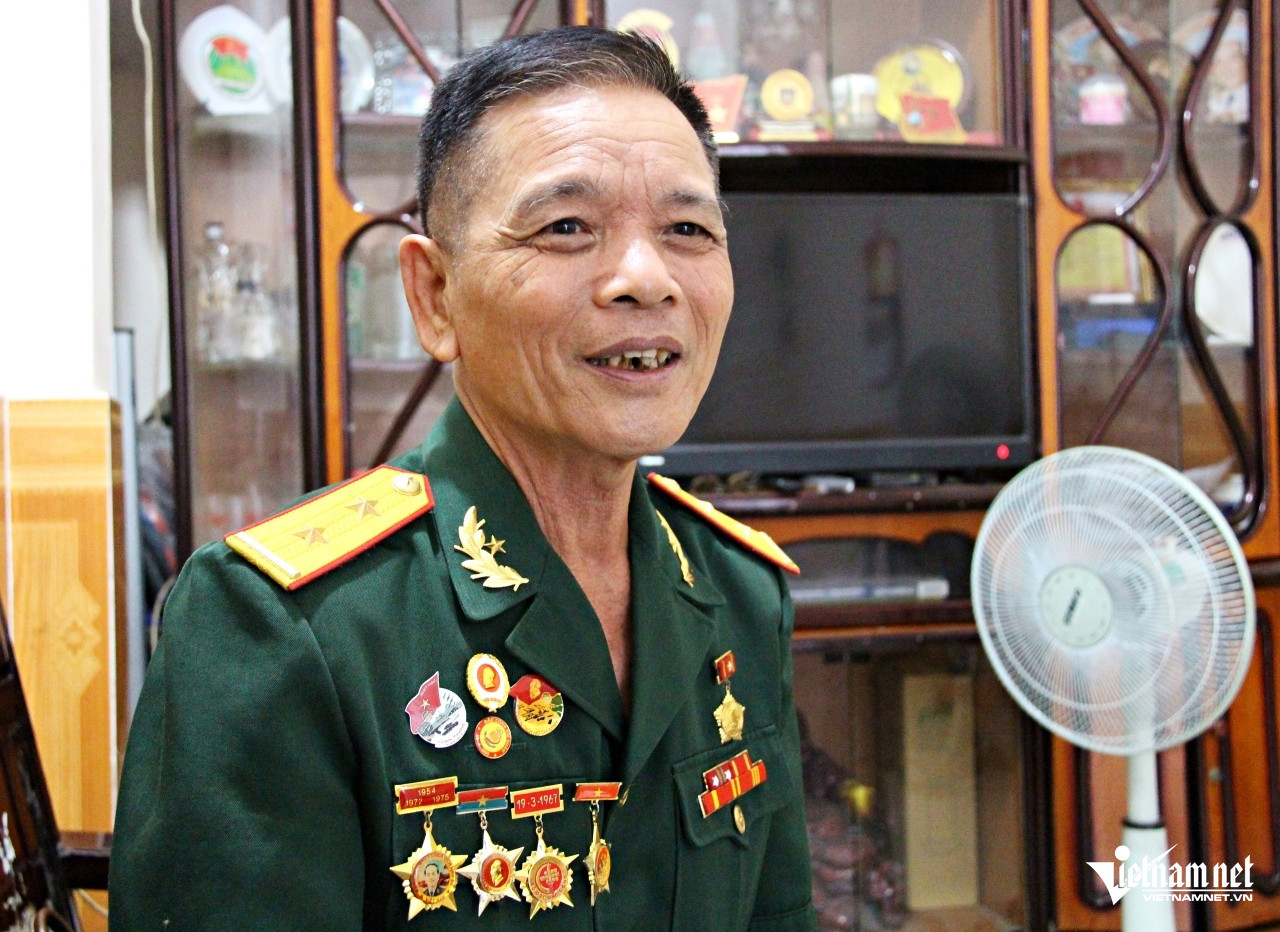
Tho was born into a revolutionary family. His father served in the army since 1946 and fought at the historic Dien Bien Phu Battle. His mother worked in the commune’s women’s committee and was a youth volunteer.
In his childhood, Tho joined the Young Pioneers, leading a youth cooperative.
In 1972, Tho constantly heard news about the battles in the South. He understood that greater victories meant higher demands for food, supplies, and manpower. Driven by the slogan, “All for the frontlines, all to defeat the American invaders,” he resolved to write a ‘blood letter’ volunteering to enlist.
“Back then, all young people were eager to enlist and fight for national reunification. And so was I,” he recalled
‘Blood letter’
“To show my earnest desire to joy the army, I wrote my volunteer letter in blood. At the end of a long training session, I showed it to my classmate Nghia. She was stunned to see it written in blood. After I explained, she understood and supported me.
“Right after the session, I was the first to submit my letter, signing up to enlist.”
Recruited into the naval special unit, Tho underwent a year of special training organized by the navy at Cat Hai Island, in Hai Phong, and Quang Ninh.
In 1974, his unit was ordered to march along the Ho Chi Minh Trail to the Southern Central Command in Tay Ninh. From there, he was assigned to Unit Z23 under the 316th Special Forces Brigade.
Z23 was stationed in BinhTrungTay near the enemy’s base at RachChiec Bridge. It was a swampy area, lined with lush water coconut groves along the river. On daytime, Tho and his comrades hid in the groves. At night, he secretly swam the river to scout enemy positions.
“To block liberation forces in the area, the enemy sprayed toxic chemicals and defoliants, stripping trees bare. For months, we took turns swimming and diving to covertly scout the Republic of Vietnam Navy Command at Bach Dang Habor (now on Ton Duc Thang Street, District 1, HCM City),” Tho recalled.
B40 shot opens historic campaign
By noon April 25, 1975, Tho’s unit received the order to gather strength to seize and hold Rach Chiec Bridge, paving the way for the main army to advance into Saigon.
“This was a vital route to the city center. The Republic of Vietnam’s army deployed about 2,000 troops with advanced weapons to guard it.
“At night, helicopters took turns shining lights along Bien Hoa Highway and neighboring Saigon areas. The Republic of Vietnam’s army was ready to destroy the bridge to block our advance. Therefore, capturing and holding this bridge was a critical mission for Tho’s unit,” he explained.
Tho was tasked with firing the first shot to open the battle.
On the afternoon of April 26, 1975, after meals, Z23 fighters prepared weapons and reached the assembly point to approach the target. By 11 pm, the unit neared the enemy base’s fence, ready to fire.
At 3.15 am on April 27, 1975, lying near the water’s edge, Tho raised his B40 and fired the first shot. But the round was missed.
“Realizing this, I stood upright, aimed carefully, and fired again. The round hit, demolishing the watchtower and destroying their machine gun,” Tho recalled.
Following Tho’s B40 shot, the entire 316th Brigade’s commandos attacked enemy bunkers and fortifications. The well-prepared assault went smoothly. Within half an hour, Tho’s unit seized RachChiec Bridge.
The enemy, caught off guard, fled or was captured. Later, the enemy regrouped to retake the bridge. Many of Tho’s comrades were wounded or killed.
After a day of fierce fighting, Tho’s unit was ordered to retreat to preserve forces. On the night of April 29, 1975, they were ordered to retake the bridge, and be sure that it wouldn’t be destroyed.
At 5 am April 30, 1975, the entire unit opened fire simultaneously.
The surprise attack from a short distance demoralized the enemy, who fled in panic. From the water, they surged up, clinging to the bridge’s base, firing fiercely to secure it.
“At 7 am, the vanguard of our 2nd Army Corps reached Rach Chiec Bridge. We embraced each other, overwhelmed with joy and emotion in that heartfelt reunion,” he said.
“Minutes later, my comrades and I were ordered to protect Thu Duc Power Plant. By 1pm, we heard that Duong Van Minh had surrendered unconditionally.”
Ha Nguyen